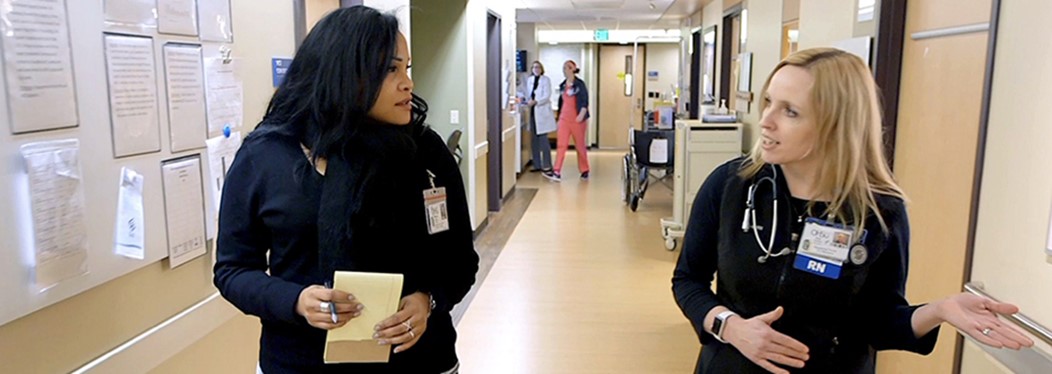CareOregon invests $700,000 for a new OHSU harm reduction nurse to support substance use treatment and overdose prevention in the region

With substance use disorders on the rise and drug overdose deaths in Oregon nearly doubling between 2019-2021, we are seeing an increased need in overdose treatment and prevention. CareOregon has provided OHSU with a $700,000 grant to hire a new harm reduction nurse as well as fund harm reduction supplies for the next two years in an effort to reduce the rising rates of overdoses in the region.
“Year after year, we see a substantial increase in drug overdoses. What it comes down to is that overdoses are preventable, period,” said Stacie Andoniadis, CareOregon Substance Use Disorder Program Manager.
“Investing in this work is about saving lives; that is why we are honored to support OHSU in hiring a new harm reduction nurse who will be able to engage directly with people who use drugs to prevent overdoses, improve their overall wellbeing and scale substance use disorder treatment and other life-saving health care services.”
This new role will also help fill a gap in the substance use treatment services. Currently, hospitals are low on resources to be able to support the number of people who need substance use support and intensive intervention.
Using harm reduction strategies, the harm reduction nurse will be able to provide specialty consult services and support the growing need for substance use treatment, serving hundreds of additional patients in the region. Harm reduction strategies have been shown to increase the likelihood of patients seeking treatment, using fewer substances and reducing their likelihood of an overdose.
“Anywhere between one-in-six and one-in-nine hospitalized adults have a substance use disorder and our consult service is just not resourced to see all of those patients,” said Honora Englander, OHSU Addiction Medicine Physician.
“A harm reduction nurse will provide direct support to patients and build capacity within the nursing staff to have more tools to support patients, specifically focusing on overdose prevention and harm reduction strategies. This new role is so important to improving our ability to meet patient and staff needs.”
In partnership with the OHSU Improving Addiction Care Team (IMPACT), the harm reduction nurse will employ harm reduction techniques through a patient-centered, judgement-free and trauma-informed approach that prioritizes listening to the patient’s highest priority needs and aligning their interactions accordingly.
The nurse will conduct bedside visits with patients who have substance use disorders to ask them about their use practices and what their concerns and goals for treatment are, with the goal of reducing their risk of overdose and other harms brought on by drug and alcohol use.
If patients are ready to engage in treatment, then the harm reduction nurse will begin the process of substance use treatment by referring them to the consult team to start a treatment plan. If the patient is not ready to disrupt use, then the harm reduction nurse will take time to educate them on safer drug use and help them avoid overdose in the future.
In addition to a harm reduction nurse, the grant will also fund harm reduction supplies that support safer use. Supplies can include Naloxone or Narcan, which help reverse an opioid overdose. Harm reduction strategies, including harm reduction supplies, have proven to reduce and prevent death, injury, disease and overdose.
“An important part of having a harm reduction nurse is explicitly focusing on overdose prevention. We do that by spending time educating patients on safer drug use, like avoiding mixing drugs and being aware of safe practices such as carrying Naloxone to avoid or reverse overdose,” Englander said.
The harm reduction nurse will also work with other nursing and clinical staff to increase awareness of harm reduction and reduce stigma and bias while educating and training staff on harm reduction strategies.
“What we know is that stigma, discrimination and lack of awareness leads substance use patients to not seek the care they need,” Englander said. “The punitive approach to addiction within health systems just doesn't work and interferes with people getting the care that they need. That’s why we’re really excited to partner with CareOregon to transform the way we treat substance use disorders and overdoses and hopefully really make a meaningful difference in people's lives.”
About OHSU Improving Addiction Care Team
IMPACT is an interprofessional team made up of addiction medicine doctors, advanced practice providers, social workers, nurses, pharmacists, and peers with lived experience in addiction and recovery. They offer addiction medicine consults to hospitalized patients with substance use disorder. IMPACT is supported by partnerships with CareOregon and OHSU Health IDS.
